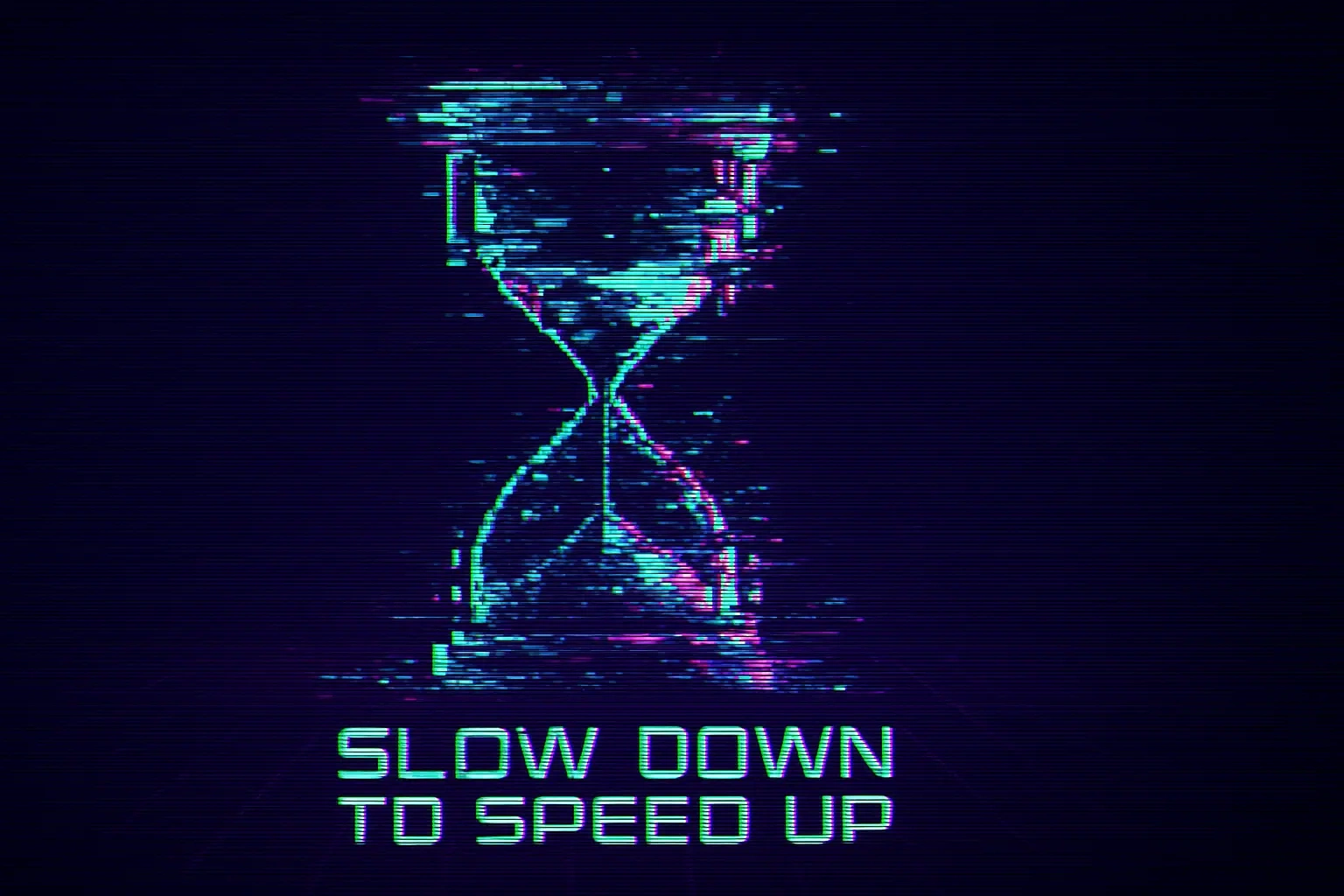Slow Down to Speed Up: Why Rushing to Hire an iOS Developer Can Wreck Your Project

Slow Down to Speed Up: Why Rushing to Hire an iOS Developer Can Wreck Your Project
The Pressure to Hire Fast
The Peril of 'Recruiting Debt'
Internal and External Pressures
The Devastating Consequences of a Rushed, Bad Hire
Increased Costs and Wasted Resources
Negative Impact on Team Productivity and Morale
Damaged Employer Brand
Implementing a Deliberate and Efficient Hiring Strategy
Defining the Role and Project Scope Clearly
The Importance of a Thorough Vetting Process
Assessing Soft Skills and Cultural Fit
Conclusion
References
Slow Down to Speed Up: Why Rushing to Hire an iOS Developer Can Wreck Your Project
When faced with tight deadlines, the pressure to hire an iOS developer quickly can be immense. However, a rushed hiring process is one of the most common and costly mistakes a company can make, often leading to a bad hire that derails projects and drains resources. This decision isn't just about avoiding a cheap developer; it's about taking the time to find the right fit.
This article explains why slowing down is crucial and how a deliberate approach to hiring is the fastest way to project success, especially when considering remote talent. You'll discover why that "quick fix" hire could become your biggest headache, and how a thoughtful process actually saves time in the long run.
The Pressure to Hire Fast
In today's fast-paced business environment, companies often feel pressured to fill open positions as quickly as possible. This urgency, driven by deadlines and stakeholder expectations, can lead to a state of 'recruiting debt' where short-term relief creates long-term problems.
Think about it this way: when your app launch is three months away and you still don't have an iOS developer, panic sets in. Your project manager is breathing down your neck. The CEO keeps asking for updates. Marketing has already started promoting the launch date. It feels like you need someone yesterday.
This pressure isn't just uncomfortable—it's dangerous. When you're desperate, you start making compromises. You overlook red flags. You skip important vetting steps. You convince yourself that "good enough" is actually good enough. Spoiler alert: it rarely is.
The Peril of 'Recruiting Debt'
Similar to technical debt, 'recruiting debt' occurs when companies cut corners in hiring to save time. This can damage the company's employer brand and lead to a poor candidate experience, deterring other top candidates from applying in the future.
Here's what recruiting debt looks like in practice. You rush through interviews, asking surface-level questions instead of diving deep into technical skills. You skip reference checks because "the candidate seems great." You ignore that nagging feeling about cultural fit because their resume looks impressive.
Each shortcut you take accumulates interest. That developer who seemed "pretty good" in the rushed interview? They might struggle with Swift's more advanced features. The person whose references you didn't check? Maybe their last three teams would have warned you about their communication issues.
The worst part? This debt compounds quickly. A bad hire doesn't just fail to deliver—they actively slow down your existing team. Your star developers spend time fixing their mistakes instead of building new features. Team morale drops. Deadlines slip even further.
Internal and External Pressures
The need to meet project deadlines, please stakeholders, or simply keep up with competitors creates a powerful incentive to rush. However, giving in to this pressure often means you end up wasting more time and resources dealing with the fallout of a bad hire.
Let's be honest about where this pressure comes from. Sometimes it's external—investors want to see progress, customers are waiting for promised features, or competitors just launched something similar. But often, the pressure is internal. We create artificial deadlines. We promise deliverables before we have the team to build them. We let optimism override realistic planning.
I've seen startups announce launch dates before they even have a development team. They figure they'll "work it out" as they go. This mindset creates a vicious cycle. The more behind schedule you fall, the more desperate you become. The more desperate you become, the worse your hiring decisions get.
Consider this scenario: Your competitor just released a killer iOS app. Your board is asking why you don't have one yet. Instead of taking a breath and building the right team, you panic-hire the first developer who can spell "Swift." Three months later, you're further behind than when you started, with a buggy prototype and a demoralized team.
The Devastating Consequences of a Rushed, Bad Hire
A rushed hiring process frequently results in a poor-quality hire, which can lower productivity, decrease team morale, and increase costs in the long run. The negative effects of a single bad hire can ripple throughout the entire organization.
Picture this: You finally hired that iOS developer after a whirlwind two-day interview process. They started last week. Already, the cracks are showing. They're struggling with basic concepts. Their code needs constant review and revision. What seemed like a solution has become a bigger problem.
But the damage goes deeper than just poor code quality. Your existing developers are frustrated. They're spending more time mentoring and fixing issues than doing their own work. The project that was already behind schedule? It's now completely off the rails.
Increased Costs and Wasted Resources
Hiring the wrong person means you've wasted money on recruitment and training, and you'll have to spend it all again to find a replacement. A bad hire can cost a company at least 30% of the employee's first-year earnings.
Let's break down the real numbers. Say you hire an iOS developer at $120,000 per year. If they don't work out, you're looking at a minimum $36,000 loss. But that's just the tip of the iceberg. Add in recruitment costs, onboarding time, training resources, and the opportunity cost of delayed projects. The real figure often exceeds 50% of annual salary.
Here's what most people miss: the hidden costs. Every hour your senior developer spends reviewing bad code is an hour they're not building features. Every meeting about "performance issues" is time away from strategic planning. Every bug that makes it to production damages your reputation and costs customer trust.
I once worked with a startup that rushed to hire three developers for a critical project. Within six months, all three were gone. The company had spent nearly $200,000 on salaries, recruitment, and training. The project was further behind than when they started. They eventually hired the right team—carefully and deliberately—and delivered the project successfully. But those six months of rushing cost them nearly a year of progress.
Negative Impact on Team Productivity and Morale
A poor performer slows the entire team down, forcing colleagues to pick up the slack and creating frustration. This can disrupt the team, weaken the company culture, and even lead to higher turnover among your best employees.
Good developers are problem-solvers by nature. But when they're constantly solving problems created by a bad hire, frustration builds quickly. They signed up to build amazing products, not to babysit someone who can't handle the basics.
The morale impact is immediate and severe. Your top performers start questioning their decision to join your company. They update their LinkedIn profiles. They take calls from recruiters. Before you know it, that one bad hire has triggered an exodus of talent.
Team dynamics matter more than most managers realize. A single negative presence can poison an entire team's culture. Maybe they're technically competent but impossible to work with. Maybe they're nice but constantly need hand-holding. Either way, the result is the same: decreased productivity and increased tension.
I've seen teams go from shipping features weekly to struggling to deliver anything in a month, all because of one bad hire. The psychological toll is real. Developers start dreading code reviews. Stand-up meetings become tense. The excitement of building something great gets replaced by the drudgery of damage control.
Damaged Employer Brand
A bad candidate experience, often a hallmark of a rushed process, can damage your company's reputation. Negative reviews on platforms like Glassdoor can deter future top talent from applying.
In today's connected world, your hiring process is part of your brand. Every candidate you interview—hired or not—can share their experience online. Rush them through a sloppy process, and they'll tell the world. Those one-star Glassdoor reviews? They stick around for years.
But it goes beyond just the candidates you interview. When you make a bad hire and they eventually leave (or you let them go), they become another voice in the chorus. They might blame your company for their failure. They might share horror stories about your "chaotic" environment or "unrealistic expectations."
The ripple effects are brutal. Top developers research companies before applying. They read reviews. They ask their network. If your company develops a reputation for rushed hiring and high turnover, the best talent won't even consider you. You'll find yourself fishing in an increasingly shallow talent pool.
Implementing a Deliberate and Efficient Hiring Strategy
To avoid the pitfalls of a rushed process, companies need a strategic and methodical approach to hiring. This involves clearly defining the role, thoroughly vetting candidates, and prioritizing cultural fit.
The good news? Building a deliberate hiring process isn't about moving slowly—it's about moving smartly. You can be both thorough and efficient. The key is having systems in place before you need them.
Start by accepting a fundamental truth: hiring well takes time. Not months, but not days either. A good iOS developer hiring process typically takes 3-4 weeks from first contact to offer. That might feel like forever when you're under pressure, but it's nothing compared to the months you'll lose with a bad hire.
Defining the Role and Project Scope Clearly
Before starting your search, create a clear and detailed job description. A well-defined scope ensures you attract candidates with the right skills and helps you avoid the confusion of mismatched or overlapping roles.
Vague job descriptions attract vague candidates. If you post "Looking for iOS developer, must know Swift," you'll get hundreds of unqualified applications. But when you specify exactly what you need—"iOS developer with 3+ years of SwiftUI experience, strong background in MVVM architecture, and experience with Core Data"—you filter out the noise.
Take time to map out the actual work. What will this developer build in their first month? First quarter? First year? What specific technical challenges will they face? What team will they work with? The clearer your vision, the better your hire.
Here's a practical exercise: Write down the top five projects this developer will tackle. List the specific technologies they'll use. Describe the team dynamics and communication style. This clarity helps you ask better interview questions and helps candidates self-select. The right person will get excited reading about these challenges. The wrong person will realize it's not for them.
Don't forget about growth trajectory. A job description that only lists current needs attracts developers who are comfortable with the status quo. But if you share your vision for where the role could grow—maybe leading a team, architecting new systems, or exploring emerging technologies—you'll attract ambitious developers who stick around.
The Importance of a Thorough Vetting Process
A comprehensive vetting process is crucial for success. This should include reviewing portfolios, conducting technical assessments or coding tests, and checking references to get a full picture of the candidate's capabilities.
Portfolio reviews tell you what candidates have built, but dig deeper. Ask about their specific contributions. What problems did they solve? What would they do differently? Anyone can list apps on a resume. You want to understand their thinking process.
Technical assessments don't need to be grueling. A well-designed 2-3 hour coding challenge can reveal more than a day of whiteboard interviews. Focus on real-world problems similar to what they'll face in the role. Watch for code quality, not just whether it works.
Reference checks are where the truth comes out. But you need to ask the right questions. Instead of "Would you hire them again?" try "What type of environment would help them succeed?" or "What kind of support did they need from you?" These questions reveal working style and potential challenges.
I recommend a structured approach: initial screen (30 minutes), technical interview (1 hour), coding assessment (take-home or live), team interview (1 hour), and reference checks. This might seem like a lot, but it's far less time than dealing with a bad hire.
Pro tip: Pay attention to communication throughout the process. How quickly do they respond to emails? How clearly do they explain technical concepts? How do they handle feedback on their code? These soft signals often predict success better than technical skills alone.
Assessing Soft Skills and Cultural Fit
Technical brilliance isn't enough; a new hire must also fit in with the company culture and work well with the team. Including team members in the interview process can help assess chemistry and prevent compatibility issues.
Culture fit doesn't mean hiring clones of your existing team. It means finding people whose working style, values, and communication preferences align with your team's needs. A brilliant developer who can't collaborate is worse than a good developer who elevates everyone around them.
Get your team involved early. Have potential hires meet the people they'll work with daily. Watch the interactions. Does conversation flow naturally? Do they ask thoughtful questions? Can they explain technical concepts in a way everyone understands?
Look for specific behaviors that matter in your environment. If you have a remote team, test their written communication skills. If you do lots of pair programming, see how they collaborate in real-time. If you value mentorship, ask about their experience teaching others.
Red flags to watch for: dismissive attitudes toward other team members' questions, inability to accept constructive feedback, or signs of "lone wolf" mentality. These issues only get worse over time. No amount of technical skill compensates for someone who destroys team cohesion.
Remember, you're not just hiring for today's needs. You're building a team for tomorrow's challenges. The right developer will grow with your company, take on new responsibilities, and help recruit other great talent. That only happens when they genuinely connect with your mission and mesh with your team.
Taking time to find this fit isn't slowing down—it's setting yourself up for sustainable speed. A well-matched developer will be productive faster, stay longer, and contribute more than someone who's just technically qualified.
Conclusion
The temptation to rush hiring will always exist. Deadlines loom. Pressure mounts. That empty desk feels like it's costing you money every day. But remember: a bad hire costs far more than an empty seat.
Slowing down your hiring process isn't about perfectionism or analysis paralysis. It's about being strategic. It's about recognizing that the right developer hired next month will contribute more than the wrong developer hired tomorrow.
Build your hiring process before you need it. Define roles clearly. Create assessment criteria. Train your team on interviewing. When the pressure hits—and it will—you'll have a system to rely on instead of making decisions from desperation.
The math is simple: spend three weeks finding the right person, or spend three months dealing with the wrong one. The choice is yours. But I can tell you from experience, the companies that thrive are the ones that choose wisely, not quickly.
Your next iOS developer is out there. They're talented, collaborative, and excited about your mission. They're worth waiting for. They're worth the extra interviews, the thorough reference checks, and the thoughtful evaluation. Because when you find them, they won't just fill a role—they'll help build your future.
So take a breath. Slow down. Trust the process. Your future self (and your team) will thank you.
References
Like this project
Posted Jul 6, 2025
In a hurry to get your app built? Rushing the hiring process for an iOS developer is a recipe for disaster. Learn the critical steps to a deliberate and successful hire.









